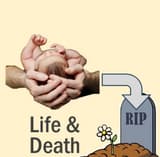Pro: There Is More
Back to listing
What’s the point of human existence? Our lives begin, we’re born into this world, we live . . . and, eventually, we all die. What enduring significance do the choices we make have? No doubt we strive to make a difference in the lives of our loved ones, and also commit our time and resources to other worthy causes. Those are sure signs we yearn for more, that we desire greater fulfillment for ourselves, family, friends, and fellow human beings. What accounts for this human hope and longing? Many atheists, humanists, and agnostics counter pessimistically, arguing that we’re all born to die and decompose, like all other biological entities. As Dr. Richard Dawkins, the prominent atheist biologist says, "The universe we observe has precisely the properties we should expect if there is, at bottom, no design, no purpose, no evil, and no good, nothing but blind, pitiless indifference." Christians would take issue with Dr. Dawkins, and yet even atheists and Christians could agree we all desire greater meaning in our lives. Christians claim they have found what’s missing. Let’s explore this claim further.
Background

The industrial revolution, with its breakthroughs in science and new technologies, has dramatically improved health and comfort in society as a whole, especially in the West. As a result, much of the developed world has grown accustomed to fulfilling material needs and desires beyond the basics. Indeed, despite poverty and suffering for some, many enjoy a comparative lifestyle and longevity limited previously only to kings and queens in past centuries. Modern amenities such as air-conditioned homes, computers, advances in medicine, cell phones, cars, and many entertainment and hobby options are now commonplace in the developed West. Even a mere century ago, most heads of households worked six to seven days a week just to feed their families. Their primary concern was focused on survival, and yet they seemed to have had a greater appreciation of what really matters than many do today. Could we in the 20th and 21st centuries have overvalued our technological and social progress, placing too little emphasis on the real meaning and purpose in life? As Dr. Jean Baudrillard, a French sociologist, said regarding our modern material affluence, "we live in a world where there is more and more information, and less and less meaning."
It’s also important to consider that while life expectancy has dramatically increased in recent centuries, human life here on earth still remains finite. Whether we may live to be 45 or 95 years old, old, we all still die. To be sure, while the writings and other accomplishments of the rich and famous have some level of societal staying power, all of these individual “creators” have died: Aristotle, Julius Caesar, Moses and Muhammed Ali, Elvis Presley, Albert Einstein, Steve Jobs, Robin Williams, and Whitney Houston. We all will confront the same fate, all with at least some psychological and/or physical pain at various points in our lives, even with the assistance of modern drugs and therapy—further reminding us of our fleeting time here on earth. Do we ultimately desire something? Perhaps Someone? Needing and wanting more than what this material world can provide?

Consequently, when certain modern scientists speculate beyond their expertise about the whys and hows of human life, we should realize their existential pedestals from which they preach, are rather fragile. For example, consider Dr. Stephen Hawking, the famous cosmologist who once stated, "Afterlife is a fairy tale for those afraid of the dark." In his transition from life to death on March 14, 2018, perhaps Dr. Hawking finally experienced that human life does continue, and so maybe he was encouraged to humble himself before Him whom he had long denied? In turn, while Richard Dawkins rejects the created moral order, the best he can offer us is the hope of actually becoming our own “God” with own created purpose when he said “… our life is as meaningful, as full and wonderful as we choose to make it.” Is this a “gospel” (good news) worth dedicating your life to, a story worth risking your long term life for? Or are you willing to consider another Gospel, another story?
The Christian story provides a much more hopeful and meaningful outlook than what Messrs. Hawking and Dawkins propose: It is an existence in which our choices on earth make a vital difference for ourselves and others, because there is life after death, and so how we live now and what we choose to believe will impact not only how we live today, but forever. As St. Ignatius of Loyola said, "God freely created us so that we might know, love, and serve him in this life and be happy with him forever." Consequently, the lives of Jesus’s follower’s past, present and future, have an unmistakable purpose. As St. Ignatius adds, “God’s purpose in creating us is to draw forth from us a response of love and service here on earth, so that we may obtain our goal of everlasting happiness with Him in heaven.” In the end, says St. Augustine, we are created by God for God: “My heart is restless until it rests in You (God).” Are you restless, seeking peace? Could there be more to life than perhaps what you’ve previously envisioned?
Christians recognize that we have a broken relationship with our Creator, not only because of the sin of our first parents, but also because of our own transgressions that have alienated us from our Creator. Yet, amidst feelings of emptiness and the lack of purpose that results, we need to realize that Jesus has reconciled us with His heavenly Father through His sacrifice on the Cross (John 3:16–17). He’s given us the opportunity to become His disciples, children of the Father (Rom. 8:15–17), so that we might live joyful, purpose-driven lives here on earth with the promise of far greater fulfillment with Him to come in heaven. This is the Christian story. Yes, there are still unknowns and trials to encounter on our Christian journey, but there is plenty of good evidence to show that trusting Jesus and accepting your role in the Christian story will be the best decision you’ve ever make for yourself and for your loved ones.
Summary
The advances of society and technology over the past few centuries have brought forth significant improvements to human life here on this earth. Still, an existence without your Creator is an ultimate dead-end. "On certain continents, poverty is more spiritual than material,” said St. Mother Teresa. “A poverty that consists of loneliness, discouragement, and the lack of meaning in life." If the points made in this brief resonate, we encourage you to explore this section of Christian Decisions. It’s your life; it’s your decision. We pray you make it the Christian Decision.
Click on the links provided to access a range of resources, including videos, documents, quotes, and books on how Christianity can provide you with true guidance and purpose that will yield everlasting joy.
There's so much more!
You're asking the right questions, and now you want to dig a little deeper.
